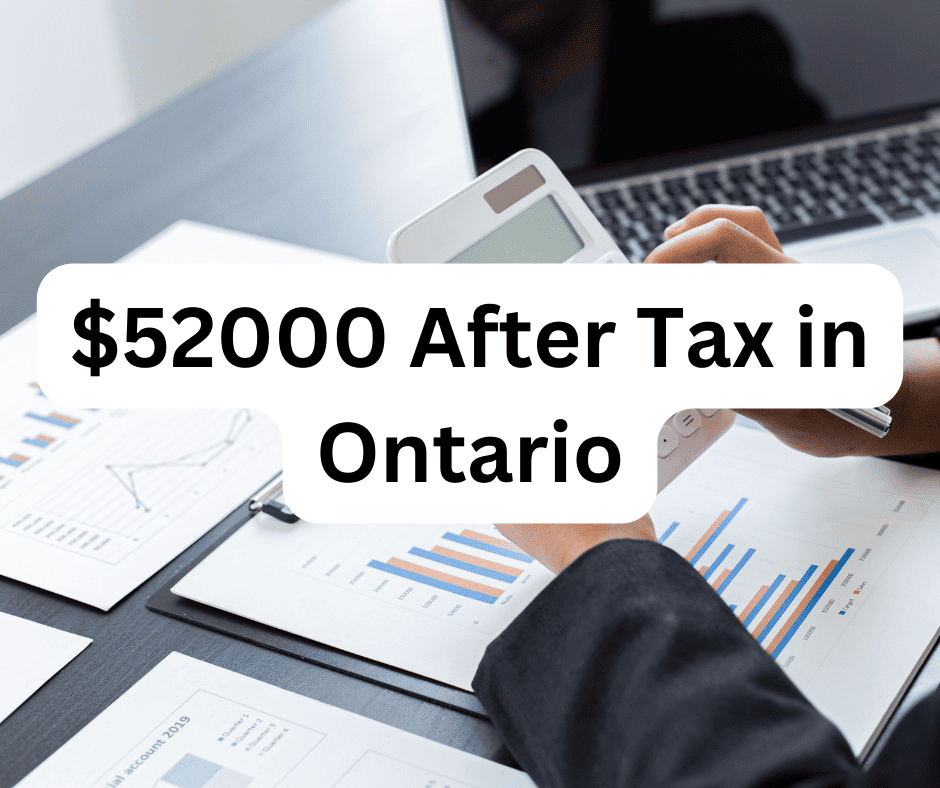A $52,000 annual salary in Ontario translates to a good middle-income salary. As of 2024, it falls under the second federal income tax bracket, between $50,197 and $100,391, taxed at 20.5%. At the provincial level, it falls under the second tax bracket between $46,226 and $92,453, taxed at 9.15%.
After accounting for federal and provincial income taxes, Canada Pension Plan (CPP) contributions, Employment Insurance (EI) premiums, and other deductions, the average Ontario resident will take home about $41,094 per year or $3,424 per month on a gross $52,000 salary.
Below we analyze the key deductions, income taxes, take-home pay, purchasing power, and how $52,000 compares to average and middle-class incomes in Ontario.
Marginal vs Average Tax Rates
There are two main types of income tax rates in Canada's progressive tax system - marginal and average:
- Marginal tax rate: The rate applied to your next dollar of income, i.e. your highest tax bracket. This is 35.3% for $52,000 salary.
- Average tax rate: Your total income tax paid divided by total income. This is 27.0% for $52,000 salary.
While a $52,000 salary falls under the 35.3% marginal tax bracket, the average tax rate is lower at 27.0% because not all income is taxed at the highest marginal rate. The first $50,197 is taxed at just 20.5% federally and 5.05% provincially.
Key Deductions
The key deductions from a $52,000 annual salary in Ontario are:
- Federal income tax: $7,175
- Provincial income tax: $3,282
- CPP contributions: $2,765
- EI premiums: $822
This totals $14,043 in deductions, leaving an after-tax net income of $37,957 per year or $3,163 per month.
Monthly Take-Home Pay
Based on the above deductions, the monthly take-home pay on a $52,000 annual salary in Ontario is:
- Gross monthly income: $4,333
- Total monthly deductions: $1,170
- Net monthly income: $3,163
This leaves $3,163 per month for living costs like housing, transportation, food, entertainment, etc. Individual circumstances and lifestyle will determine whether this provides a comfortable living standard.
Purchasing Power
While a gross income of $52,000 provides a middle-class lifestyle, inflation steadily erodes purchasing power over time.
An individual grossing $52,000 in 2024 would need to earn $56,860 in 2029 just to maintain the same purchasing power, assuming inflation averages 2% per year over that period.
Comparison to Average and Middle-Class Incomes
- The average individual income in Ontario in 2021 was $53,000, comparable to $52,000 .
- However, the average household income was $107,000, more than double an individual income of $52,000.
- Middle-class income ranges between $33,000 and $66,000 per individual in Ontario, putting $52,000 at the higher end.
So while $52,000 provides a decent middle-class lifestyle for an individual, it is low compared to average household incomes in the province.
Tax Rates
As mentioned earlier, federal and provincial income tax rates in Canada are progressive - higher incomes are taxed at higher rates. In Ontario, the tax rates on a $52,000 salary are:
Federal:
- First $50,197 taxed at 15%
- Remaining $1,803 taxed at 20.5%
Provincial:
- First $46,226 taxed at 5.05%
- Remaining $5,774 taxed at 9.15%
This results in an average tax rate of 27.0% across federal and provincial taxes.
Tax Credits and Benefits
Lower-income Canadians can qualify for tax credits, rebates, and benefits to reduce taxes owed and supplement income []:
- Canada Workers Benefit - refundable tax credit supplementing labor income
- GST/HST credit - sales tax rebate paid quarterly
- Climate action incentive - rebate for carbon pricing systems
- Ontario Trillium Benefit - three refundable tax credits to supplement income
However, at $52,000 most credits/benefits start phasing out. An individual would need to earn below $24,000 to gain the full benefit.
Retirement Planning
The average retirement income in Ontario is about $27,000 per individual []. To maintain a $52,000 income in retirement:
- Maxing out RRSP contributions can result in nearly $700,000 in savings over 30 years, providing retirement income of $28,000 from a 4% withdrawal rate [].
- Contributing to an employer-matched defined benefit pension plan can replace about 50-70% of pre-retirement income.
- Unlocking home equity, CPP payments, OAS, and other sources, in addition to private savings, helps bridge the gap to $52,000.
Retirement readiness ultimately comes down to saving early and consistently throughout one's working life.
Is $52,000 a Good Salary in Ontario?
Given its positioning compared to average incomes and tax rates, a $52,000 salary provides a decent middle-class lifestyle in Ontario. However, it is low compared to average household incomes.
An individual earning $52,000 can afford a comfortable, albeit modest, lifestyle in Ontario. They can afford necessities, some extras like entertainment/vacation, and middle-class housing/transportation with careful budgeting.
However, saving for major goals like retirement or home ownership will require diligent long-term saving and likely dual incomes for those with families.
Conclusion
In summary, a $52,000 annual salary places an individual in Ontario's middle class with a 27% average tax rate and $3,163 in monthly take-home pay. It is comparable to average individual incomes but only half of average household incomes. While providing a comfortable lifestyle, hitting major financial goals will require prudent budgeting and conscious saving over time, especially for those supporting families. Tracking purchasing power and utilizing tax credits provides further financial flexibility.

